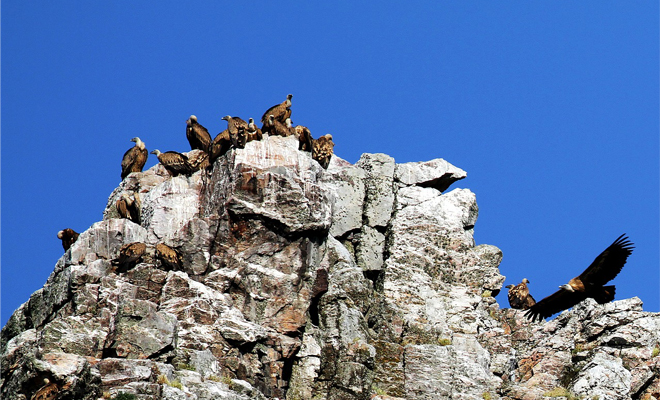Living with Vultures in the Sixth Extinction: An Ethnographic Study of Avian Conservation in Changing European Landscapes (LiVE) investigates how the global phenomena of accelerating species loss and corresponding wildlife management unfold within specific historical and cultural contexts. This comparative study of vulture conservation takes place in a time of rapid global vulture decline. In India, a country where the carrion eating birds were once abundant, over 95% of vulture populations have vanished in the past decades due to their vulnerability to residues of anti-inflammatory drugs in livestock carcasses. Similar catastrophic trends are visible across their South-East Asian and African distribution ranges. Europe has become the last stronghold of these large, wide-ranging scavengers that have come to depend heavily on ongoing conservation initiatives, using management techniques such as captive breeding, reintroduction, translocation, monitoring, rehabilitation and strategically placed feeding stations to avoid deaths through direct or indirect poisoning. These conservation initiatives, in turn, depend on close collaboration with local rural communities, especially low-intensive farmers, herders and hunters and veterinarians who are directly affected by vulture management and release.
Based within the discipline of social anthropology, and drawing on an interdisciplinary framework, the project expands science-centred discourses on wildlife conservation and management to include social and cultural analysis. It will do so through a timely in-depth ethnographic analysis of the situated practices, techniques and ideas involved in vulture conservation today, emplaced in the particular historical, social and political contexts of rural communities in Europe. The research will result in an innovative, integrative study of how to understand and manage wildlife conservation in the Sixth Extinction. Insights gained through the study will thus be of relevance to academic and applied environmental research, while also contributing new knowledge to wider public debates.

Sara Asu Schroer was awarded a PhD in Social Anthropology from the University of Aberdeen and completed a post-doctoral research fellowship as part of the ERC-funded project Arctic Domus: Humans and Animals Across the North at the same institution. Her current research is situated in the field of environmental anthropology and more-than-human ethnography and is broadly concerned with how humans perceive, think about and relate to nonhuman living beings and their environments. Through grounded ethnographic research, she explores the conceptual, methodological, as well as ethical implications that arise when anthropologists open their analysis to other living beings as active participants in shared social worlds. A current interest lies in the study of species loss and its socio-ecological consequences for human and nonhuman communities in the Sixth Extinction.
